- Home
- Deborah Kerbel
Mackenzie, Lost and Found
Mackenzie, Lost and Found Read online
Mackenzie, Lost and Found
Mackenzie, Lost and Found
by Deborah Kerbel
Copyright © Ponytail Productions Ltd., 2008
All rights reserved. No part of this publication may be reproduced, stored in a retrieval system, or transmitted in any form or by any means, electronic, mechanical, photocopying, recording, or otherwise (except for brief passages for purposes of review) without the prior permission of Dundurn Press. Permission to photocopy should be requested from Access Copyright.
Editor: Barry Jowett
Design: Erin Mallory
Printer: Webcom
Library and Archives Canada Cataloguing in Publication
Kerbel, Deborah
Mackenzie, lost and found / by Deborah Kerbel.
ISBN 978-1-55002-852-2
I. Title.
PS8621.E75M32 2008 jC813’.6 C2008-906145-4
1 2 3 4 5 12 11 10 09 08
We acknowledge the support of the Canada Council for the Arts and the Ontario Arts Council for our publishing program. We also acknowledge the financial support of the Government of Canada through the Book Publishing Industry Development Program and The Association for the Export of Canadian Books, and the Government of Ontario through the Ontario Book Publishers Tax Credit program, and the Ontario Media Development Corporation.
Care has been taken to trace the ownership of copyright material used in this book. The author and the publisher welcome any information enabling them to rectify any references or credits in subsequent editions.
J. Kirk Howard, President
Printed and bound in Canada.
Printed on recycled paper
www.dundurn.com
Dundurn Press
3 Church Street, Suite 500
Toronto, Ontario, Canada
M5E 1M2
Gazelle Book Services Limited
White Cross Mills
High Town, Lancaster, England
LA1 4XS
Dundurn Press
2250 Military Road
Tonawanda, NY
U.S.A. 14150
For Jordy, always
Chapter 1
The walk through Ben Gurion International Airport was long. Too long. A scrambled mix of foreign words and sounds filled my ears as I dragged my feet towards the baggage claim. After being cooped up inside a plane with my dad for twelve hours, my bleary eyes took in the jumble of people around me. There were men in tall black hats and heavy black coats, women in long skirts and wrapped hair with litters of kids tagging along behind them, and tons of hippy-ish men and women who looked dressed for the beach.
But what really freaked me out were the soldiers patrolling the crowds and guarding the entrances and exits. They all looked so young — too young to be in the army. In fact, I guessed they couldn’t be much older than me. They all had long, black machine guns slung over their backs. Until now, I’d never seen a real gun before in my life. Was this really what passed for normal in this country?
When Dad and I finally got our suitcases, we stumbled out into the greeting area. A sea of eager faces surrounded us — faces searching for loved ones, relatives, and friends. We pushed our way as politely as possible through the dense crowd.
I tried to keep my eyes on the ground. The warm hugs, the cries of joy, the tearful reunions, all made me sad — I knew no one was there waiting for us. Here I was, thousands of miles from home, and all I had left in the world were Dad and a suitcase. It was absolutely the loneliest moment of my life.
Pulling our bags behind us, we walked outside through the sliding-glass doors. A whoosh of hot, humid air rushed up to greet me as I stepped out onto the pavement. It was almost seven o’clock in the evening and the air was sizzling like bacon on a hot frying pan.
Suddenly, out of nowhere, we were bombarded with an onslaught of taxi drivers. All were men with slim builds, olive skin, and dark, curly hair. All dressed in a similar uniform of T-shirts and cotton pants.
“Please … please!” urged one with a big grin, pointing over to his car.
“Over here!” beckoned another. “I take you where you want to go!”
“Nice, air-conditioned ride!” announced a third at the top of his lungs.
Maybe it was because of his loud voice, or maybe it was because of the hot, sticky weather, but Dad chose the driver with the air-conditioning advertisement. As for me, I was just happy to be leaving the airport. We piled our bags into the trunk of the dirty white taxi and jumped inside.
The drive to Jerusalem was a long, winding, uphill trip. Our taxi sped along at a fast clip, hugging every curve of the highway. I chewed on the end of my little fingernail as I stared out the window. I know it’s gross, but I’ve always had the worst habit of gnawing on my nails when I’m upset or stressed out. In the past year my fingertips have become a set of mangled stumps.
After forty-five minutes we arrived in a city filled with buildings, people, and busyness. Suddenly, there was so much to see: buses everywhere, little boys playing soccer in the streets, women wearing head scarves toting their babies and shopping bags, soldiers standing guard in front of every store, and buildings so much older than any I’d ever seen back in Canada. They even had graffiti here, too, although I couldn’t tell if the words were written in Hebrew or Arabic.
Our taxi zipped through the streets, which had narrowed and grown increasingly winding. Horns were honking from every direction as drivers, who seemed high on aggression and low on patience, flew by at breakneck speeds. I started to feel dizzy as the car darted around sharp corners and through tiny gaps in traffic. A couple of times I had to close my eyes as the driver negotiated our taxi through a space that looked much too tight. Somehow, however, he managed to get us through each time without a scratch. After a particularly sharp turn, Dad leaned over and whispered, “Different from home, isn’t it?”
That was probably the understatement of the century. This place was nothing like home. I nodded slightly and held my stomach, praying I wouldn’t throw up.
I felt like an alien who’d just landed on a strange planet. Even my body signals were confused. Although I knew it was technically evening, it didn’t feel like it. I’d lost all sense of time up in that plane. Now I didn’t know if I should be hungry or thirsty, sleepy or awake. I took a deep breath and thought about the return airline ticket tucked away in the bottom of my suitcase. Dad had promised that I could go back home to Toronto if I hated it here after three months. It was the only way he’d been able to get me on that plane.
A moment later, he leaned forward and gave the driver an address.
“Is that where we’re going to live?” I asked.
“Yeah, I got us an apartment in a nice family neighbourhood near the university,” he replied. “Apparently a lot of the faculty live in the area. It’s called French Hill.”
“French Hill,” I repeated under my breath. I liked the name of the place. It sounded almost familiar, like a neighbourhood you might find in Canada.
But it didn’t look at all like Canada when we arrived. The taxi pulled up at an apartment building on a quiet street, set a bit back from the main road. Surrounded by olive and lemon trees, the building was made from large blocks of bumpy, dust-coloured stone. Nothing at all like the red and brown brick buildings I was used to back in Toronto.
“That’s Jerusalem Stone,” explained Dad, noticing me staring. “They chop it right out of the ground near the Jordan River. By law, every structure in Jerusalem must be built with it.”
I nodded and opened the taxi door. The instant I stepped out, an overwhelming aroma of spice and frying oil wafted under my nose. Jerusalem definitely didn’t smell like Canada, either!
Dad paid the driver an
d we walked into the building, dragging our bags behind us. The first thing I noticed was the list of tenants on the apartment mailboxes.
“Har-Zahav … Ben-Shahar … Yedidyah … Zahavy … Machuv … Azoulay,” I whispered under my breath, sounding them out slowly. Each one of them was a tongue twister.
“So where to now, Dad?” I asked, glancing around the rest of the lobby, half-hoping there would be another Canadian from the university there to greet us. But the only other person in the lobby was a middle-aged woman puffing away on a cigarette — even though it was clear from the signs that this was a non-smoking building. I tried to breathe through my mouth so I wouldn’t smell her stinky cloud of smoke, but it didn’t work. Christina and I tried smoking a couple of years ago. Back then, I thought smoking a cigarette would be glamorous and very grown-up. But it didn’t feel that way at all. In fact, after three puffs, I ended up with my head over the toilet talking to Ralph on the big white telephone. Pretty glamorous, huh? And ever since then the smell of smoke grosses me out.
Dad rummaged through his pockets and pulled out a folded envelope. Inside was a key chain and a small piece of paper.
“Says here that we’re on the top floor,” he said, walking over and pushing the button for the elevator. We rode it up to the top, which didn’t take very long since there were only four floors in the building. It felt weird riding an elevator to my home; until this moment, I’d always lived in a house.
At door number 403, Dad turned the key in the lock and we stepped inside. Instantly, a feeling of relief came over me. Finally, here was something that reminded me a bit of home — Nana Pearl’s condo back in Toronto, to be specific. Like Nana’s, the furniture was a mix of modern pieces and older antiques. And, like Nana’s, the space was roomy and open — more than enough for two people to live comfortably.
I dropped my bag in the front hall and ventured further in. There was a small television set at one end of the living room and an upright piano at the other. On the wall in between, an arched wicker bookshelf housed a collection of paperbacks, which, I was relieved to find, were all in English. The floors were covered in tile instead of carpet or hardwood. Despite the dark furniture, however, the place was pleasantly bright with rays of soft evening light streaming in through the windows. And thankfully, there was air conditioning.
I wandered further and found the kitchen. The appliances looked new but there was less floor and counter space than what I’d been used to at home. And the oven was the tiniest I’d ever seen. How can anybody roast a Christmas turkey in that? I opened up the cupboards and peeked inside; they were bare but clean. I closed them up again and thought about my old kitchen in Toronto. In the past year I’d pretty much taken over the cooking duties. On Dad’s nights, we just ordered pizza. In the beginning, I hadn’t really minded. But after a year, I was sick of it. When the delivery guy starts to feel like a member of the family, you know you’ve got problems. Every time he rang our bell, it reminded me of how alone Dad and I were.
It was in that kitchen back home, three months ago almost to the day, that Dad had dropped the bombshell about Israel. I’d known something was wrong when I found him chopping vegetables for a tomato sauce.
“What are you doing? It’s my turn to do dinner tonight,” I reminded him, pointing to the calendar of household chores that hung on the fridge.
But he just smiled mysteriously and kept chopping. Actually, it was more like hacking.
“I know you’re getting tired of all those pizzas, so I thought I’d try making something myself. And actually, I have a bit of exciting news.”
News?
I sat down on the nearest chair and waited. I could tell by the tone of his voice that it was going to be big.
“I’ve been offered a prestigious honour at work,” he began. “Something I’ve been dreaming about most of my career. It’s a visiting professorship at The Hebrew University in Jerusalem for the coming school year. I’m going to be the associate director of the continuing excavation in Tiberias.”
My jaw dropped open. “Um, what exactly does it mean?” I could feel the muscles in my chest begin to tighten up — somehow I knew his answer wouldn’t be good.
Dad put down the chopping knife and reached for my hand. “Honey, it means that, as of July, we’ll be moving to Israel.”
“What?” I gasped, staring at him as if he’d just announced that we were re-locating to the moon. “Who? You and me?”
“That’s right,” he replied, his smile fading fast, “I … I was hoping you’d be surprised!”
I shut my eyes for a second and tried to make some sense out of what I was hearing. When I opened them again, I could tell by the deep frown lines on his forehead that this wasn’t a joke.
“No! We can’t go to Israel!” I said, yanking my hand away. “We’re Canadians! This is our home!”
“Of course this is our home,” he said gently, “but saying no to an honour like this would be like turning down the Nobel Prize. Anyway, travelling to a new place is an adventure. It’s only for a year. I thought this would be a great opportunity for us.”
I felt like screaming, An adventure? Are you crazy? But when I opened my mouth, no words came out. My chest was getting tighter and tighter — it was getting hard to breathe, let alone talk.
Until that moment my entire religious experience had been limited to Santa Claus, the Easter Bunny, and a couple visits to Christina Georgas’s Greek Orthodox Church. What on earth would we do in Israel?
“But Dad,” I finally managed to squeak out, “we’re not religious at all! We’re not even Jewish! Why do you want to go there?”
He waved away my concerns.
“You don’t have to be Jewish to live in Jerusalem. It’s considered the centre of many different religions. And the opportunities for archaeological study are tremendous! Tiberias is a fascinating place, Mack: an ancient city where Jesus preached back in Biblical times. And the team in Israel is hoping I can help them uncover signs of Herod’s palace. Just imagine … I might help to discover one of the greatest archaeological treasures in history. You can even help on the dig if you want — it’ll be exciting!”
Herod’s palace? Unearthed antiquities? Exciting?
“You can’t make me, Dad. I … I won’t go!”
He took a deep breath, as if he needed to gather his strength before continuing.
“Oh yes you will, honey,” he replied. Although his voice was quiet, his tone made it clear there was no room for debate. “Can’t you see how badly we need to get away from this place? You and I are all we have left in this world and, damn it, we do things together!”
His words stabbed at my heart. I couldn’t believe what was happening. I felt like I’d been dropped into a speeding car that was about to drive off the edge of a steep cliff. Suddenly, my mind started swirling with violent little snippets I’d seen on the news about Israel: bombings, uprisings, terrorism, rocket attacks. Just the thought of moving there raised a swarm of goosebumps on my arms and legs. For the past year, I’d been paranoid about dying a sudden, violent death — like it was my genetic destiny or something. And Dad wanted to move us to the Middle East? No way, we couldn’t move there!
But we did. Despite all my protests, our old kitchen and our old home were sold out from under me.
And now, here we were in a new home, and Dad was looking at me anxiously.
“So, what do you think?” he asked, his voice rising with hope. It was a loaded question. From the look on his face, I knew he wasn’t just asking about the apartment. He was asking what I thought about the entire deal: the country, the people, the whole new life he’d arranged for us. Spinning around on my heel, I ignored his question and wandered off to look at the rest of the apartment.
“Which room’s mine?” I asked, opening up doors. The first one I tried looked like a linen closet and the second one was a bathroom, which immediately reminded me of how badly I had to go.
“Excuse me for a second,” I said, shutti
ng the door behind me. “I’ll be right back.”
After doing my business, I pulled up my pants, washed my hands, and turned around to flush.
“Huh?” I said, staring down at the pair of buttons on top of the toilet.
“Um … Dad … I think I need some help in here!”
He opened the door and peeked inside.
“What is it, honey?”
When he saw me standing over the toilet, a look of understanding flickered across his face and he started chuckling.
“That’s okay, I read about this, too. You see, here, lots of Israeli toilets have two flushers, the smaller of which uses the lesser volume of water needed to clear out a ‘number one.’ In other words, that’s a half flush for urine and a full flush for …”
“Okay Dad!” I interrupted. “Thank you very much — I get the picture!”
As my face turned red, I pushed the smaller button and walked out. Dad followed behind, all the while explaining Israel’s brilliant technological feats.
“They’re very advanced in a lot of different areas: science, cancer research, military technology, and, naturally, water conservation, being in the desert and all. It can get extremely dry here; there are times when the very religious pray for rain.”
Gee, sounds pretty technical there! Do they use voodoo dolls as well?
“Dad, you’re lecturing again,” I interrupted. “And it’s been a long trip. I’m exhausted and I think I need to lie down.”
“Of course, Mack. I don’t know what I was thinking,” he said, opening up the door directly across the hall from the bathroom. “I think this one’s your room. You have a nice rest.”
He reached out to give me a hug, but I stiffened at his touch. A look of hurt flashed across his face. I felt a small twinge of pity for him as he walked away. As wrapped up as I’d been in my own problems, I sometimes forgot that the past year had been hard for him, too. But I squashed that twinge before it got any stronger. I just couldn’t feel sorry for someone who was ruining my life.

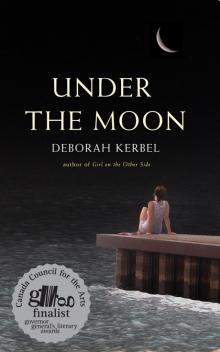 Under the Moon
Under the Moon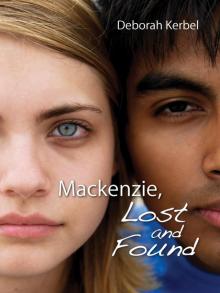 Mackenzie, Lost and Found
Mackenzie, Lost and Found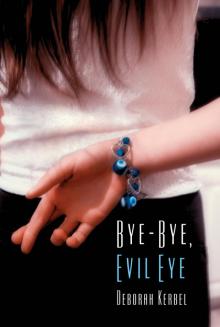 Bye-Bye, Evil Eye
Bye-Bye, Evil Eye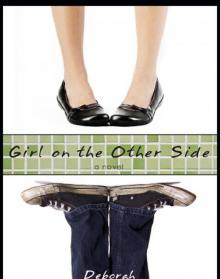 Girl on the Other Side
Girl on the Other Side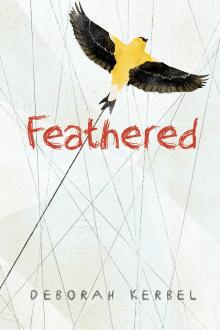 Feathered
Feathered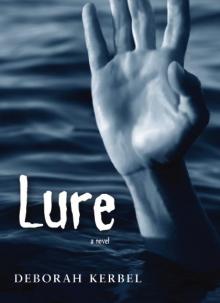 Lure
Lure